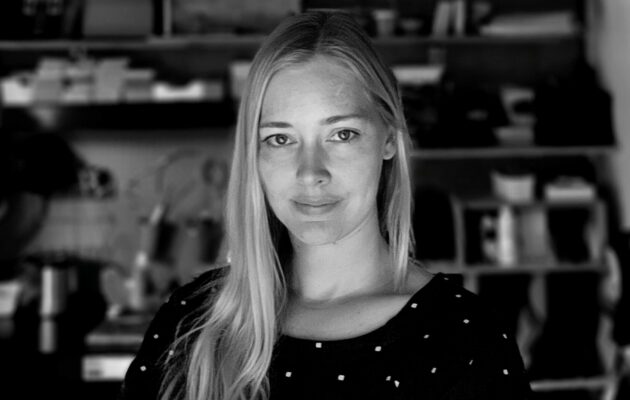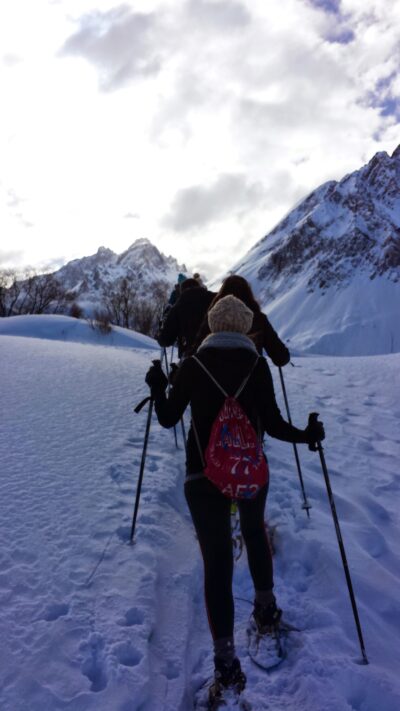
We’re asking students, recent grads, teachers, and counselors five questions on how languages play a role in shaping personal and professional success…
Meet Brittney Gehrig—a Boise State University educator from Idaho who holds a Master's degree in French pedagogy and linguistics from Middlebury Language Schools.
1. As a college student learning French, did you study abroad? Where did you go and what were your biggest takeaways from the experience(s)?
During my undergrad at Boise State I did my first study abroad over a summer in Pau, France, with the USAC (University Studies Abroad Consortium) program. It was a great way to go abroad as a first-timer but still see some familiar faces, as two of my professors were visiting profs at USAC Pau that year. I stayed with a host family for that trip, but the following year I completed a semester-long study abroad program in Lyon, France (also with USAC) and stayed in the dorms.
My biggest takeaway from these experiences was the personal growth that came with living with strangers and meeting so many people from different countries. I learned things about my perceptions, my personality, my limits. Being able to step outside of my comfort zone and gain a greater understanding of how other people live and by extension examining how Americans live was invaluable to me.
2. You participated in the Teaching Assistant Program in France (TAPIF) after graduation! We’d love to hear more: What was involved? Could you share a favorite memory or anecdote?

I was accepted to the TAPIF program after being placed on their waiting list for a brief time. I was placed in the Académie de Nantes, a city I had never heard of before! As an elementary assistant, I worked in three different schools. I would visit each school on different days of the week and facilitate language ateliers, where we played games, read books, sang songs or did different activities to expose them to English language and American culture.
The kids were adorable and looked so forward to having their assistant visit each week—there were a lot of excited squeals on the playground as they saw me walking up the path to the school!
Though I cherished my time in the classroom, I think some of my most fond memories come from the moments spent in the teacher’s lounge. I found it fascinating that all of the teachers gathered together every day in all three schools to eat together over their lunch period, which was quite different from what I’d seen back home—everyone staying in their classrooms to work over the short lunch break. I made it a point to bring this tradition back with me to my own school, where I tried to host my teacher friends for lunch as often as possible despite our tight schedules and busy workloads.
These spontaneous interactions in my académie pushed me in my comprehension skills and taught me so many cultural lessons. I hope everyone pursuing the TAPIF program has the opportunity to connect with their schools and teachers in this way!
3. Did you always want to pursue a career as a language educator? When did you know this was the path for you and what steps did you take to make it happen?
On a recent trip back home to Sacramento, I found a short essay from the third grade in which I wrote: 'When I grow up I want to live in Europe for one year.'
I don’t remember writing this or what prompted it but apparently it stuck with me subconsciously as I grew up and embarked on my studies!
As I started college, I loved exploring, learning, and speaking a second language but thought that teaching wasn’t for me. I couldn’t fathom the idea of me standing in front of a class full of teens or adults and facilitating 50 minutes + straight of language classes! Oh, how things have changed! After achieving my year(s) abroad, I explored the option of being an educator by substitute teaching in French classrooms in the Boise School District. I knew by that point that I didn’t want to teach elementary students, but I thought that subbing was a fun way to use my French and be involved in the teaching community.
It just so happened that there was an emergency teaching position open in two schools at the end of summer and I jumped at the opportunity. I had never officially taught before and had no formal training, but looking back, I think that it was the best way for me to dive in. I ultimately got my teaching certificate to teach K-12 French through an alternative program, and later got a Master's degree from the Middlebury College School of French.
It truly was such a serendipitous series of events and though it was never my plan, I am so grateful that things unfolded the way they did. I feel like I come alive in the classroom and really connect with my students. I want to empower them to learn a language and explore new cultures, and hopefully inspire a few future language teachers along the way.
4. How do you use your language skills outside of the classroom?
I feel lucky to be in a place where there are many opportunities to interact with people in my second language. I have been treasurer and secretary of our Boise Alliance Française branch and try to engage in community events with Francophones and francophiles whenever possible.
I am also on a team of K-16 instructors working on a project at Boise State called Français inclusif, which is an OER text (Open Educational Resources). I am very proud of our project which provides a complete, free product for instructors to use in the classroom for French 101, 102, 201, and 202, including day-to-day in-class activities, interactive homework, an online workbook and reference for grammar and vocabulary and, most importantly, a focus on the greater Francophone world. I love being able to use French to be creative and benefit other teachers, providing students with inclusive materials that get them thinking about different cultures and places their language studies can take them.
Lastly, I am fortunate to be able to travel to France for professional development outside of the realm of teaching. I have taken stained glass workshops to further my skills in this art that I have fallen in love with over the last decade. Furthering my craft in the language and country I love so much has been truly rewarding for me and helped me to incorporate new methods and ways of thinking about glass art into my work. Learning a technical skill in a second language is a great reminder that I will always be a student of French, no matter how advanced the degree or how much I’ve learned since I started taking French.

5. What’s the best part of being a language educator? What would you say has most surprised you about language teaching?
The best part of being a language educator is sharing my enthusiasm for the language and Francophone cultures with students. It is so rewarding to teach a subject that is so multifaceted—there are the linguistic aspects of teaching, literature, conversation, cultural traditions, and so much more—all of which can completely change students’ way of viewing the world around them. I also love the way that teaching leaves space for new growth and personal development.
I never do the same thing twice from year to year; the materials and the students will always be evolving, which presents an opportunity for me to evolve as well. I learn so much each year as I prepare my classes and I can’t imagine being in any other line of work!
As for surprises, I’m continuously blown away by the creativity that is possible in teaching language. When my mom learned French in elementary school in the 60s she was taught by rote memorization and reading from classic texts. When I learned in high school, I was in a somewhat immersive environment but still relied on textbooks and their ancillary materials to learn (hello, Allez viens videos!).
Today, we have unlimited access to authentic materials, videos by native speakers, and other resources that have the potential to excite and engage students with diverse interests. It’s utterly overwhelming to consider just how much you could comb through and curate for a simple thematic unit for a French class, but I think that’s been the greatest surprise as a teacher and content creator for OER. Anything is possible and our students can access the target language in unprecedented ways.
There is also a tremendous community of French teachers online who share their creative work, lessons, assessments, and thematic units. It is such a joy to be able to collaborate and share materials and know that somewhere out there, an amazing French teacher has probably already made something for that unit you’re thinking of—and they might have incorporated some really unique ways of approaching teaching it!
Sharing and learning from colleagues far and wide has been one of the most gratifying parts of being a language teacher.
BONUS QUESTION
Complete this thought: “Learning another language means…”
My answer for this question is influenced by the poster I have hanging in my office in the World Languages building at Boise State! It is an image I printed out from the ACTFL website years ago—a quote from Charlemagne: “To speak another language is to possess another soul.” I can’t seem to come up with a better definition because this rings true for me daily!
I feel that my experiences abroad, in language classes, and in the target language with French speakers have truly unlocked a different part of me that I may never have found if I hadn’t been interested in those things. A second language really does mean a second way of viewing things through the lens of language and culture and can be so valuable in terms of empathy, understanding and exploring. I’ll keep thinking about this one…
Check out our Connect with French or Become a Language Educator pages to explore language scholarships, university programs, testimonials, and more! And, as always, visit @LangConnectsFdn on social media to share your story with us.
